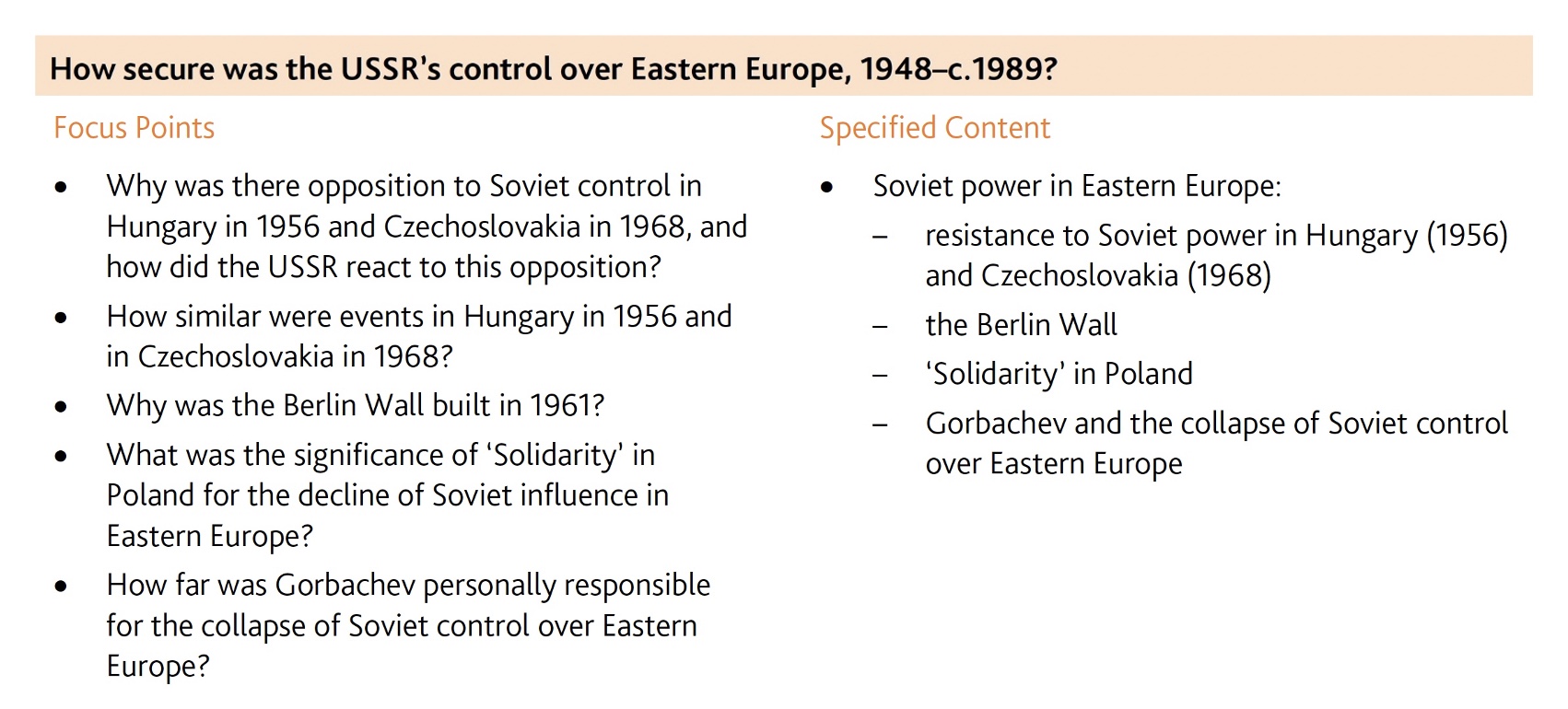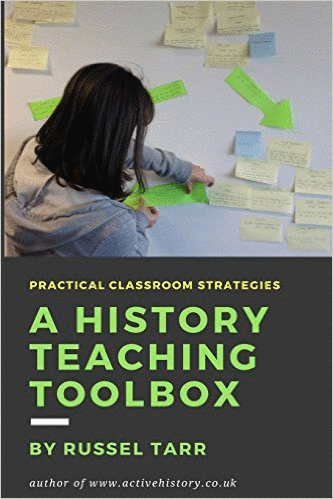World History teaching resources for the high school classroom: lesson plans, worksheets, quizzes and simulation games for KS3, IGCSE, IB and A-Level teachers.
There is no clear statement in the IGCSE syllabus regarding the date period covered by the topic. However, in my opinion the examination will cover a topic from the 1980s (e.g. Solidarity in Poland, the role of Gorbachev), especially since the main Paper 1 syllabus addresses the questions "What was the significance of 'Solidarity' in Poland for the decline of Soviet influence in Eastern Europe?" and "How far was Gorbachev personally responsible for the collapse of Soviet control over Eastern Europe?".

To what extent was the collapse of communism in the USSR the result of Gorbachev's policies?
- Overview: Eastern Europe in 1989
- Students are provided with essential terminology and produce their own account of the events of 1989-91 by comparing and making deductions from two maps of Europe during the period.
Factor 1. Internal Problems
a. Political Tensions within the USSR
- General Problems: Long Term - Dictatorship and Corruption
- Students compare and contrast democracy and dictatorship and produce a written summary outlining the inherent weaknesses of the Soviet system.
- Specific Problems: Short Term - The "Gerontocracy"
- Students investigate the "Rule by Geriatrics" - Brezhnev, Andropov, Chernenko - and how this lack of flexibility led to the tragedy of the Korean Airliner incident of 1983.
b. Social-Economic Problems within the USSR
- General Problems: Long Term - Underproduction and Demotivation
- Students compare and contrast communism and capitalism and produce a written summary outlining the inherent weaknesses of the Soviet system.
- Specific Problems: Short Term - Chernobyl and Lake Baikal
- Students investigate the problems in agriculture, industry and society that plagued the USSR by the 1980s. They look at a number of Soviet jokes from the period and deduce what these tell us about life under Soviet rule.
- [Sourcework on Socio-Economic Factors]
Factor 2. External Problems
- Eastern Europe: Long-Term - Rebellions 1956-68
- Students investigate the uprisings in Poland, Hungary, East Germany, Czechoslovakia to develop their understanding of the poor socio-economic conditions in the Eastern Bloc.
- Eastern Europe: Short-Term - Walesa and Pope John Paul II
- In this task students discuss the respective roles of the key individuals and then answer some source work questions about the Solidarity movement.
- Afghanistan
- In this card-sort activity students piece together the causes, course and consequence of the war with Afghanistan, which caused such havoc for the military and the economic position of the Soviet Union.
- USA: Long-Term - The Nuclear Arms Race
- Another pressure upon the Soviet Union was the massive cost of keeping up with the United States in terms of nuclear weapons. Students answer questions based around a timeline and as an extension activity conduct some research into the Cuban Missile Crisis.
- [Sourcework on the Nuclear Arms Race]
- USA: Short-Term - Reagan and "Star Wars"
- President Ronald Reagan contributed to the decline and fall of the Soviet Union by adopting an aggressive, uncompromising policy towards communism. Students investigate his policies and their impact upon the USSR through a timeline and some source work questions.
Factor 3. The Role of Gorbachev
- Gorbachev's Policies: Glasnost and Perestroika [plus linkage sheet and teacher notes]
- Students complete a table which helps them to assess the problems Gorbachev faced, how he chose to deal with them and how appropriate they consider these policies were.
- Video Clip: Gorbachev's Rule (7m)
- The Collapse of Soviet Control in Eastern Europe
- Students conduct their own research about how each of the countries in the Eastern Bloc broke away from Soviet rule 1989-91.
1. Stalin's Interview to "Pravda" Correspondent Concerning Churchill's "Iron Curtain" speech
2. Pope John Paul II and Communism
3. 15 Interesting Cold War Vintage Ads - Oddee.com
15 Interesting Cold War Vintage Ads
4. Berlin Wall: voices of the revolution | World news | guardian.co.uk
5. Great Walls in History: Photos | Newsweek International | Newsweek.com
6. Brezhnev Attempted to Advance Soviet Goals Through Detente
7. Video: Berlin Wall: 20 years after the fall (videos)
GCSE / IGCSE History - Main Menu

© 1998-2026 Russel Tarr, ActiveHistory.co.uk Limited (Reg. 6111680)
1 Torrin Drive, Shrewsbury, Shropshire, SY3 6AW, England
Privacy Policy | Contact






